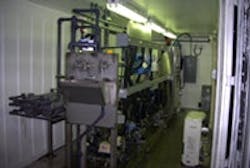ITT Aquious-PCI Membranes Help Alaska School District Win NWRA's Great American Water Taste Test
Teachers and students in Kipnuk, Alaska, enjoy the best tasting water in the nation, according to the National Rural Water Association (NRWA). What's their secret? The school, which gets its water from rainwater and surface sources, uses a FYNE membrane filtration system from Aquious-PCI Membranes Systems, Inc. of Milford, Ohio to treat its drinking water.
The FYNE Process has become the water treatment technology of choice for rural communities that get their water from organic-laden surface sources like lakes or rivers. Nanofiltration membranes reject undesired dissolved organic materials (mostly humic and fulvic acids) that, after chlorination, yield undesired disinfection by-products like TTHM (trihalomethanes) and HHA(5) (haloacetic acid). The membrane system also reduces undesirable levels of iron and other metals, which may be found in these types of surface water. In addition, the membranes hold back waterborne pathogens, microbes and viruses.
Surface water near Kipnuk averages 8 milligrams of organic content per liter. However, since it is used to supplement rain catchments, the actual amount of organic matter in the water varies widely over time. The FYNE Process, which uses proprietary half-in. tubular membranes that resist blinding, is ideal for this type of filtration. The tubular membranes require minimal pre-filtration and can be kept clean by periodically passing a foam ball down the length of the tubes. This makes them much less costly to operate and maintain than spiral membranes, which require up-stream pre-filters to remove suspended solids down to 10 microns and frequent chemical cleaning.
The units used by the Kipnuk school (and two others in Kongiganak and Kwigillingok) are small even by FYNE standards, processing just 1.1 gpm. After being processed, the water at the schools meets or exceeds standards for drinking water for TTHM (< 80 ?g /l) and HAA(5) (<60 ?g/l). Turbidity levels are typically below 0.1 NTU. Standards require <0.3 NTU. The systems are simple and automated enough to allow unattended operation, with intervention on no more than a weekly basis for routine operation and maintenance. The systems can be monitored continuously and remotely through an Internet connection.
The NRWA selected Lower Kushkokwim School District (LKSD) of Bethel, Alaska, which operates the school in Kipnuk, as the winner of the Annual Great American Water Taste Test held recently in Washington. D.C. LKSD competed against the top water systems from 48 state rural water associations to take the honor.
Source: Aquious-PCI Membranes Systems, Inc.
